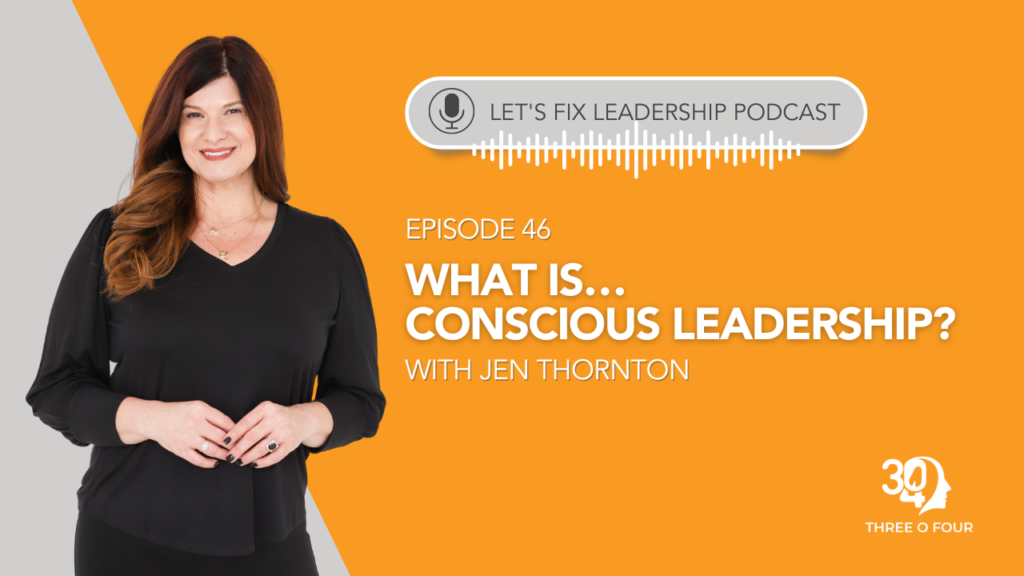Not sure who said that, but the statement has inspired a lot of thought, reflection, and furious rabbit-hole research. So I thought to myself, why not share all my findings and musings with you?
Leading in today’s world requires approaches that transcend traditional management practices. It’s about fully understanding the intersection between ourselves, our teams, and our organizations. Self-awareness, emotional intelligence, curiosity, and system thinking…these are all things that lend to conscious leadership.
How do we bake this concept into our mindsets and actions? In this episode, I talk about conscious leadership and why it’s so important.

“An organization can’t perform at a level higher than the consciousness of the leadership.” source unknown
0:00:01.0 Jennifer Thornton: An organization cannot perform at a level higher than the consciousness of the leadership.
[music]
0:00:11.9 JT: Welcome back, friends. This is your place or cutting edge tools, exercises, best practices, and modern leadership strategies, because in the world that's changing, it's time to bring our leadership styles along for the ride. Whether you're a company leader, a corporate visionary, and entrepreneur, this show gives you new insights into the neuroscience and the language of leadership, plus practical steps and tips to lead your teams in a powerful way, but also help you keep your people happy and engaged, all while achieving your biggest goals. I'm your host, Jen Thornton. I'm a talent strategist, a brain-based executive coach, speaker, and the founder of the 304 Coaching. Now, let's fix leadership.
[music]
0:00:54.8 JT: This is a powerful statement, and I wish I knew who had said it. I came across the statement while doing research the other day, and of course it got me thinking about my own leadership consciousness and what it even means. And that led me down another rabbit hole all while enjoying some free WiFi at Starbucks on Saturday afternoon, and then I thought why enjoy this rabbit hole research alone. So here I am speaking into a microphone, sharing it with you. So to get back to our topic, the statement we're playing with today is, "An organization cannot perform at a level higher than the consciousness of the leadership."
0:01:34.0 JT: So what is conscious leadership? I'm not really sure. I'm not sure if it's a skill. I kind of believe it's a mindset. It's a way of perceiving and interacting with the world that transcends traditional management practices. At its core, this consciousness involves a deep understanding of oneself, one's impact on others, and the systematic interconnections within and with outside an organization. Maybe it's the elevation of self-awareness, and I think self-awareness is where we start on our journey to leadership consciousness. The best performing executives have an acute understanding of their strengths, their weaknesses, emotional triggers, and their biases.
0:02:21.2 JT: So what do we add to the self-awareness to build on our consciousness? I think the next layer is emotional intelligence. Emotional intelligence is a critical component of conscious leadership. It empowers leaders to empathize with others, manage their reactions, and navigate in our personal relationships.
0:02:44.4 JT: The third layer to this consciousness we're building is system thinking. The system can be a lot of different things. Understanding all the different systems and their complexity, that inter-relation, there's interrelated structures, and really how do we define an organization or what are market dynamics, and all of those systems really are building our leadership consciousness. Leaders adept in system thinking can anticipate consequences, identify leverage points and implement solutions that serve the broader objectives of the organization and its stakeholders, customers in that marketplace.
0:03:25.5 JT: Now that we have an idea of what builds a mindset of a conscious leader, that self-awareness, emotional intelligence, and system thinking, how do we work on baking these ingredients into our own mindset?
[music]
0:03:41.7 JT: Let's take a quick break from the conversation. Do you have new leaders on your team and you can see their potential, you can see their runway, but you cannot figure out how to get them across the finish line? Reach out to 304 Coaching and learn more about our brain-based, competency-focused executive coaching.
[music]
0:04:01.4 JT: Conscious learning clearly helps with conscious leadership. We love to talk about the pace of change here at Let's Fix Leadership, and that applies to this too. Conscious Learning is about taking in all those small cues, those comments, those conversations. It's about recognizing what you can learn from just being conscious about the things around you. Now, let's talk about the ability to reflect. I'll be honest and say this is one of the hardest things for me. I'm a person who likes a full schedule and I don't like silence. I like to keep my brain moving forward, but I know that reflection is where I actually grow. Reflection allows the noise to become conscious learning.
0:04:49.2 JT: We have already said that conscious leadership is a mindset. So clearly, we need to be mindful. A mindful practice can significantly enhance a leader's consciousness by fostering a state of presence and attentiveness. This heightened state of awareness enables leaders to make more considerate decisions, remain open to new ideas and communicate more effectively with their teams. It's about taking the learning, the reflecting, and then becoming mindful on how you process it. And to do these things, you have to be present.
0:05:26.6 JT: There are a lot that goes into the work of being present. Maybe someday I'll actually do a podcast on just that one topic, it would fill up probably three shows, but for today, let's just talk about it at a high level. Being present is about showing up mentally, not just with your physical being. It's about listening to what is said and not said in any interaction. It's about being curious and being open to those around you. Let's talk more about being curious. If you are working on conscious leadership, you will have to be curious. Curious about yourself, which builds that self-awareness and curious about things around you. Ask questions you don't know the answer to. It's actually harder than you might think. If you wanna learn more about questions you can ask that you will not know the answer to, I've done two episode with just these types of questions. You can go back, check 'em out, and listen to them. And if you're curious about asking questions you don't know the answer to, you will have to embrace diversity of thoughts. Being a conscious leader is about knowing you don't know it all, and you might know very little about any given topic. Embracing others' views will drive a higher level of thought within your team, and it will drive innovation.
0:06:51.0 JT: So as you can see, being a conscious leader is really about being a mentally-resilient leader. It's leveraging the model of self-awareness, emotional intelligence, and system thinking. As a reminder, the quote that inspired today's episode is, "An organization cannot perform at a level higher than the consciousness of the leadership." We have to be conscious leaders and create environments where others can be conscious leaders too, because no one ever fixed leadership by closing down consciousness and self-growth.
[music]
0:07:33.0 JT: Thanks for listening to Let's Fix Leadership. By hanging out with me today, you're already on your path. If you're looking to learn more and to see if your company is a good fit for our coaching and leadership education, then hey, visit 304coaching.com. If you got value out of this podcast, share it with a friend, and it would mean the world to me if you would leave a of review and a rating on iTunes. Thanks again for listening, and I appreciate your work in fixing leadership.
[music]



